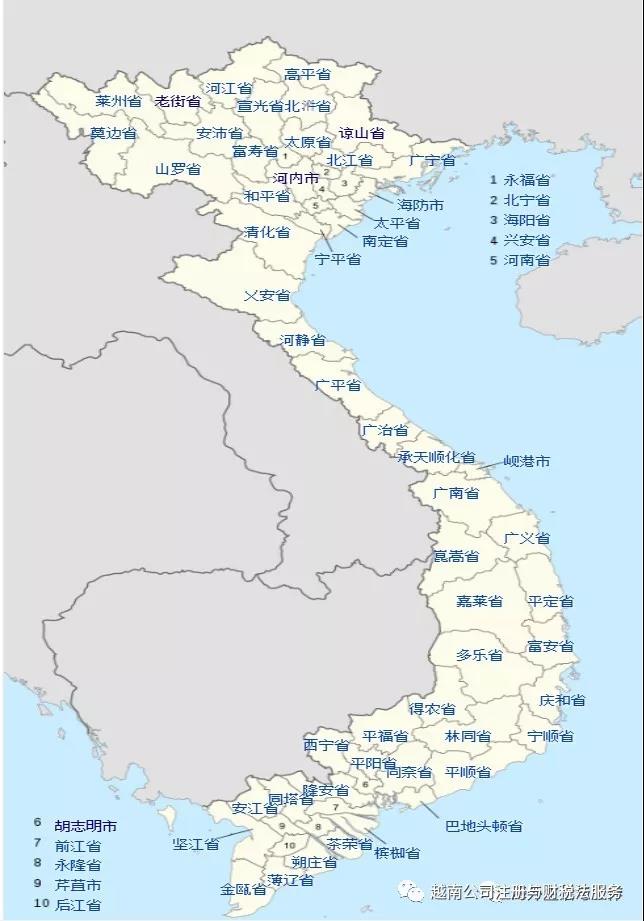This service account insists on originality. The author is Zhang Xiaoming, partner of Zhuozhi (Vietnam) Accounting Firm, three years of multinational enterprise management experience, six years of listing audit experience, five years of entrepreneurial experience, Chinese certified public accountant (CPA), international certified public accountant (ACCA) ). WeChat: hy945568
The Vietnamese government allows and encourages foreigners to make direct investment through the establishment of companies in Vietnam. Vietnam has two main forms of foreign investment enterprises: 100% foreign-invested enterprises (FOEs) and joint ventures (JVEs).
A 100% FOE can be established in the form of a limited liability company (LLC) or a joint stock company (JSC) by one or more foreign investors. JVE can be established as an LLC, JSC or partnership, and the profits and risks in JVE are distributed among the parties in proportion to their capital. Other options for establishing a business entity in Vietnam include representative offices and branches, but these are not legal entities.

The main legal entities are:
limited liability company
Corporation
Partnership
Representative Office
branch
Business Cooperation Contract
Specific authorized items
However, in some cases, there are certain restrictions on investment capital, investment areas, and special permits required. Before starting business in Vietnam, you may need to consider the following questions:
1. What kind of businesses can be invested in Vietnam?
In Vietnam, foreign direct investment (FDI) is divided into unconditional investment areas and conditional investment areas. It is easier to establish a company in the field of unconditional investment than in the field of conditional investment. Investments in IT services, manufacturing, management consulting, and marketing are unconditional investment areas. Conditional investment fields, such as real estate, transactions, travel agencies, freight forwarders... The investment conditions in these fields are more complicated. According to the WTO commitments Vietnam has entered, these investment conditions may also change over time.
2. How to name a company in Vietnam?
The Vietnamese company must have a Vietnamese name and an English name. The company may also have an abbreviated name. The name of a Vietnamese company needs to indicate the company's type, business, and a name that is different from other companies.
3. Where to register a business address in Vietnam?
Not every address can be used to register a company. The registerable address must be the address of a house or office building with a lease agreement, and the office building must have an operating permit. If the factory is registered, the address must be placed in the industrial zone.
4. What is the legal structure of the company?
According to the amount of funds provided by investors, the company can be established as a member limited liability company or two or more member limited liability companies or joint stock companies.
5. How much capital is needed to set up a company in Vietnam?
The amount of investment depends on the business plan and needs to be evaluated and approved by the Ministry of Planning and Investment of the province. In some business areas such as real estate, banking and finance, there are minimum capital requirements. Generally speaking, in the field of unconditional investment, the law does not stipulate the minimum capital for establishing a company in Vietnam (recommended to be more than US$10,000), but the government agency evaluating the investment plan can reject investment projects that they think are not feasible. The bank statement of a foreign bank can be used to prove sufficient investment funds.
6. Who will be the legal representative and work permit of Vietnam?
Investors need to appoint legal representatives in Vietnam to monitor business performance and assume legal responsibilities in Vietnam. If the legal representative is a foreign person, a member or owner of a limited liability company, or a member of the management committee of a joint-stock company operating in Vietnam, he or she will be granted an exempt work permit. Otherwise, he or she will need to obtain a work permit to legally work in Vietnam. As long as the work permit permits, the work permit holder can apply for a temporary residence card to live in Vietnam.
7. How long does it take to set up a company in Vietnam?
It depends on the type of company, its size, and whether it is a conditional investment field. For a simple investment project with no restrictions, it takes about 40 working days. The establishment of a company in Vietnam's conditional investment field will take a long time because many government agencies are involved in approving investment projects, and it takes about 60 working days. When setting up a company in a special economic zone, the time is based on the time required by government agencies. Generally, the issuance of a business license takes about 40 working days, and the tax registration is completed within 60 working days.
8. Who will obtain investment permits in Vietnam?
For most investment projects, the provincial state agency approved by the State Department of Planning and Investment (DPI) will grant Vietnam Investment Certificate. However, depending on the type, scale, and whether it is a conditional investment field, other Vietnamese state institutions may be involved. Regarding the situation of trading companies, the Ministry of Trade and Commerce, the Ministry of Finance, and the Provincial People's Committee will also review the investment application files.
9. What is the tax liability of Vietnam?
The main taxes in Vietnam are Vietnam’s corporate income tax, import and export tax, value-added tax and personal income tax. In some special areas, there are other taxes. Corporate income tax was reduced to 20% from 2016. Export taxes are mostly encouraged, so the export tax is 0, but there are special cases where the export tax is greater than 0. Import taxes vary according to tariffs. The value-added tax is mostly 10%, but in some cases, the value-added tax may be 5% or 0%. Personal income tax varies according to income level, starting from 9,000,000 VND.
10. What are the mandatory reporting requirements in Vietnam?
The company must keep accounting books every month, every quarter and every year, prepare and submit tax reports. Foreign companies also need to conduct financial audits before the end of the fiscal year. Vietnam’s fiscal year is from January to December, and the deadline for submitting financial reports is March 30 of the previous year.




